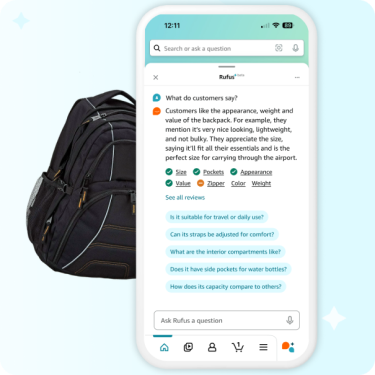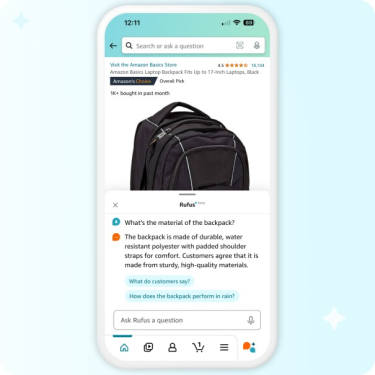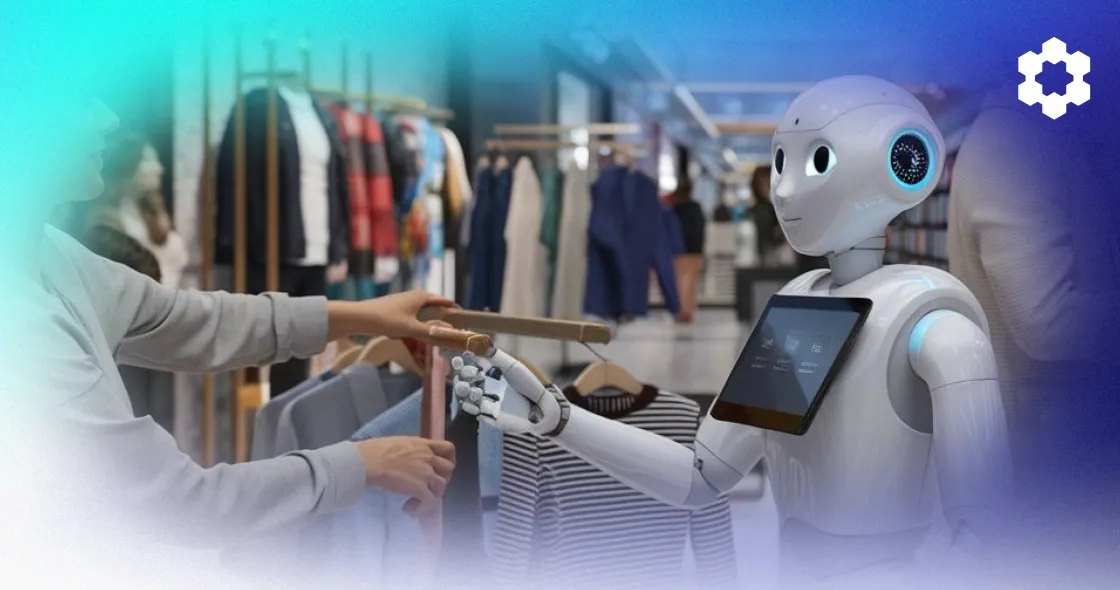In a series of announcements, Amazon has unveiled its latest advancements in artificial intelligence (AI) technology. These innovations promise to reshape the ecommerce landscape and offer new opportunities for sellers and customers alike.
Let’s dive into the details and explore what these changes could mean for your Amazon business.
Rufus: Your AI Shopping Assistant
Amazon has officially rolled out its AI-powered shopping assistant, Rufus, to all users in the US via the Amazon Shopping app and desktop.
Initially introduced to a small group of users in February, Rufus is now available to everyone, offering a new way to interact with Amazon’s vast product catalog. The AI assistant can answer product-related questions, compare items, and provide updates on orders, all through a simple tap on the app’s navigation bar.
Key features of Rufus include:
- Understanding product details and summarizing customer reviews.
- Providing personalized product recommendations.
- Comparing options across different products.
- Offering up-to-date information on the latest products and trends.
- Accessing current and past order information.
- Answering general questions to assist at any stage of the shopping journey.
Rufus draws from Amazon’s product listings, customer reviews, community Q&As, and even external web data to inform its responses.
For example, users can ask specific questions about products, like whether a coffee maker is easy to clean, or get general recommendations, such as the best outdoor speakers for a summer party.


However, the assistant’s accuracy is not always spot-on. One user shared an experience where Rufus correctly stated that the battery life of a Samsung Galaxy Watch 6 lasts 40 hours but failed to mention that this is only under specific conditions, such as turning off the always-on display.
For sellers, the introduction of Rufus could be a double-edged sword.
On one hand, the AI assistant has the potential to enhance customer experiences by quickly providing relevant product information, which could lead to higher conversion rates. On the other hand, the AI’s limitations, such as inaccuracies or the risk of providing misleading information, could lead to customer dissatisfaction and potentially harm a seller’s reputation.
This concern is amplified by comments from users who found Rufus either unhelpful or outright frustrating. One reader described the assistant as an “absolutely useless addition” that clutters the screen, while another pointed out that Rufus often generates “useless summaries” when trying to search reviews.
The broader implications of AI like Rufus for ecommerce could be significant. Some users worry that as AI assistants become more integrated into shopping experiences, they could overshadow traditional SEO and search ads, leading to a “pay-to-play” model where the transparency of product information and reviews might be compromised.
As one reader remarked, “In a year or two you will not be able to trust anything because it will all be fake,” highlighting concerns about the integrity of AI-generated recommendations.
For sellers, this means adapting to a rapidly changing landscape where AI plays a pivotal role in how products are presented and perceived. Ensuring that product listings are detailed, accurate, and optimized for AI interactions will be crucial.
However, the challenges presented by potential biases in AI-generated content and the growing skepticism among consumers also underscore the need for sellers to maintain transparency and authenticity in their offerings.
In sum, while Rufus brings new opportunities for enhancing the shopping experience on Amazon, it also introduces challenges that sellers must navigate carefully. The effectiveness of this AI assistant will depend on its ability to provide accurate, relevant information, and how well sellers can adapt their strategies to align with this new tool.
Rufus is accessible through the Amazon Shopping app by tapping the Rufus icon (chat bubbles with sparkle) in the navigation bar. Desktop users can also access Rufus by clicking on the icon at the top left of their screen or through the chat box that appears when exploring products.
Remarkable Alexa: The Next Generation of Voice AI
While not officially announced, Washington Post suggests that Amazon is working on a revamped version of Alexa, internally known as “Remarkable Alexa” or “Project Banyan.” Aimed at competing with the latest AI models from companies like Google, Remarkable Alexa is set to launch in October 2024 and promises to be a game-changer, offering enhanced features designed to increase user engagement and transform the way people interact with their smart devices.
This new version of Alexal will offer advanced features such as:
- AI-generated news summaries
- Assistance with everyday tasks
- A chatbot designed for children
- Conversational shopping tools
Unlike the current free version of Alexa, Remarkable Alexa is expected to come with a subscription cost, potentially up to $10 per month.
While this ambitious project might elevate Alexa’s capabilities, the implications for sellers could be mixed.
A Leap Towards Enhanced AI: What’s New?
Amazon has remained relatively quiet in the AI race recently, but the introduction of Rufus and Remarkable Alexa marks a significant shift. The new model will feature advanced conversational abilities, personalized shopping advice, and even a “Smart Briefing” feature that curates news reports based on user interests. These upgrades are designed to encourage daily use and boost Alexa’s relevance in an increasingly competitive market.
However, the development process has not been entirely smooth, according to Reuters. Early versions of Remarkable Alexa, based on Amazon’s in-house technology, struggled with performance, leading the company to adopt an external AI model developed by Anthropic, known as Claude. This move is notable because Amazon typically prefers to build its technology internally to maintain control over customer data and minimize reliance on third-party vendors.
Yet, the success of these features depends on user adoption. Currently, Amazon’s attempts to drive shopping through Alexa have not been as successful as hoped, and the division remains unprofitable.
With Remarkable Alexa, Amazon is betting that more intuitive and interactive features will finally turn Alexa into a meaningful sales generator.
Potential Benefits for Amazon Sellers
The introduction of Rufus and the potential launch of Remarkable Alexa represent major shifts in how customers interact with Amazon’s platform. Here’s what sellers should consider:
1. Enhanced Product Discoverability
Rufus’s and Remarkable Alexa’s ability to provide personalized shopping recommendations could drive more targeted product exposure, potentially increasing sales for those who can leverage this feature effectively.
Additionally, the enhanced conversational mode might make it easier for customers to discover new products, creating opportunities for sellers to reach new audiences. So, ensure your product listings are optimized with detailed descriptions, high-quality images, and comprehensive feature lists for maximum exposure.
2. Increased Importance of Customer Reviews
As Rufus summarizes customer feedback, maintaining a positive review profile becomes even more crucial. Focus on providing excellent customer service and actively managing your product reviews. According to BrightLocal, 27% of customers expect to see business reviews as recent as two weeks, up from 25% in 2023. Consider streamlining your customer feedback by automating review requests with SellerTools, ensuring a steady flow of fresh reviews.
3. Opportunity for Niche Marketing
Rufus’s ability to answer specific questions could benefit sellers with unique or specialized products. Consider how you can position your items to answer particular customer needs.
4. Preparation for Voice Commerce
With Remarkable Alexa on the horizon, start thinking about how your products can be easily discovered and purchased through voice commands.
5. Data-Driven Decision Making
These AI tools will likely provide Amazon with even more detailed customer behavior data. Stay informed about any new analytics tools that may become available to sellers.
Challenges and Concerns
Despite the potential benefits, some Alexa users are skeptical. The introduction of a paid version of Alexa has sparked mixed reactions.
While some Reddit users expressed willingness to try the new features, many are wary of adding another subscription to their expenses. One user commented, “Another subscription is going to be a no from me,” highlighting the challenge Amazon faces in convincing users to pay for premium features.
Moreover, the shift to a subscription model might not sit well with all users. If the majority of Alexa users stick to the free version, the impact of the new AI-powered shopping assistant on sales could be limited. Additionally, as another user pointed out, the prevalence of ads on the platform is a major concern. Unless the paid version offers a significant reduction in ads, the appeal of Remarkable Alexa may be diminished.
Overall, Remarkable Alexa represents Amazon’s bold attempt to reassert its dominance in the AI space, but the road ahead is fraught with challenges.
For sellers, the key will be to monitor how this new model is received by users and whether it truly drives more meaningful interactions and sales. If successful, Remarkable Alexa could become a powerful tool in the ecommerce landscape, offering sellers a new way to engage with customers.
However, the mixed reactions from potential users and the uncertainties surrounding the subscription model suggest that the journey toward widespread adoption may be anything but straightforward.
AI in Robotics: Amazon Supercharges Robotics with Covariant Talent
Amazon’s recent move to hire the founders and key employees of Covariant marks a huge step in its quest to accelerate the use of AI in robotics at scale.
Covariant, known for its advanced AI models that enable robots to perceive, reason, and interact with the physical world, has been a leader in warehouse automation. By bringing Covariant’s expertise in-house, Amazon aims to enhance its Fulfillment Technologies & Robotics Team, further pushing the boundaries of warehouse automation.
Following its acquisition of Kiva Systems in 2012 and more recent partnerships with AI startups like Adept, the integration of Covariant’s technology into Amazon’s operations holds the potential to revolutionize how the company manages its fulfillment centers.
The non-exclusive license to Covariant’s robotic foundation models allows Amazon to generalize how its robotic systems learn, making them more adaptable and efficient. This advancement could lead to safer, more streamlined operations, ultimately benefiting customers through faster and more reliable deliveries.
For sellers, this advancement presents both opportunities and challenges.
On one hand, the ecomm giant’s increased automation could lead to even more efficient processing and shipping, potentially lowering fulfillment costs and improving delivery times. This could enhance the customer experience, leading to higher satisfaction and repeat business for sellers. The improved efficiency might also enable Amazon to handle larger volumes of inventory, which is particularly beneficial during peak seasons like the holidays.
However, the increased reliance on automation could also introduce new challenges. As Amazon continues to streamline its fulfillment processes, sellers may face heightened expectations for inventory management and replenishment speed. Those who can’t keep up with the pace of automation might find it harder to meet Amazon’s stringent performance metrics, potentially impacting their seller ratings and eligibility for programs like Prime.
In summary, continuously advancing its robotic capabilities allows Amazon to position itself at the forefront of technological innovation in the logistics and fulfillment sector. However, it also raises the bar for sellers to stay competitive in an increasingly automated environment.
Just Walk Out Tech: More NFL Stadiums and College Campuses Go Cashierless
A few days after upgrading its Just Walk Out (JWO) technology, Amazon announced it’s expanding JWO to more NFL football stadiums and college campuses. This move signals a push towards frictionless checkout experiences in high-traffic environments.
This expansion includes the integration of Just Walk Out technology into:
- 10 additional on-campus convenience stores across the US, UK, and Australia, bringing the total number of JWO stores on college campuses to over 30 worldwide.
- More stadiums. Lumen Field in Seattle, home to the Seahawks, is leading the charge with six new JWO stores, bringing its total to 15—the highest number of any stadium worldwide. The trend continues with seven new JWO locations opening at Commanders Field outside of Washington, DC, the most stores launched at a single sports venue. Additionally, M&T Bank Stadium in Baltimore will see its first Just Walk Out store open this season.
With the technology already making waves in sports arenas, such as Lumen Field, where customer throughput increased by 60% and total transactions more than doubled, Amazon has cemented itself as a leader in the automated retail space.
What does this mean for ecommerce sellers?
The adoption of frictionless checkout technology in high-visibility locations like stadiums and campuses could set new consumer expectations for speed and convenience in retail. Sellers who embrace similar technologies or optimize their operations to meet these rising expectations may gain a competitive edge.
For example, offering seamless checkout experiences on your online stores, such as one-click purchasing or streamlined mobile payment options, could resonate with consumers who appreciate the convenience of Just Walk Out technology.
However, the expansion of JWO technology also raises the bar for sellers in terms of customer experience. As consumers become accustomed to fast, frictionless transactions in physical spaces, they may expect the same level of efficiency online. This could pressure ecommerce businesses to invest in AI-driven tools, inventory management systems (to more effectively handle peak shopping times), and fulfillment processes to match the evolving retail landscape.
Overall, the success of Just Walk Out technology in high-traffic environments like stadiums and campuses highlights the importance of convenience in today’s retail world. Both brick-and-mortar retailers and ecommerce sellers who leverage AI and automation to simplify the shopping experience can potentially tap into the growing demand for quick and seamless transactions.
Amazon’s continued expansion of Just Walk Out technology is not only transforming the retail experience at NFL stadiums and college campuses but also signaling a broader shift towards convenience that ecommerce sellers should watch closely.
Geek Break: Amazon’s Commitment to Quantum Computing
While not directly related to everyday selling, Amazon’s advancements in quantum computing showcase the company’s dedication to cutting-edge technology. Recently, Amazon Braket, AWS’s quantum computing service, launched the 84-qubit Rigetti Ankaa-2 superconducting device.
The Rigetti Ankaa-2 processor is designed to work smarter and faster than its predecessor. Imagine a network of connections where each point (or qubit) is directly linked to four others. This setup allows the Rigetti’s 84-qubit quantum processor to complete tasks more efficiently, as it doesn’t need to take as many steps to get the job done. Because of this design, Ankaa-2 performs 2.5 times better than the older model, Aspen-M-3.
Moreover, Ankaa-2 works seamlessly with both quantum and traditional computing methods, thanks to its support for AWS’s Braket Hybrid Jobs feature. Amazon Braket Hybrid Jobs allows developers to run advanced algorithms that need both traditional computing power and cutting-edge quantum technology.
When you need to solve a problem that requires both types of processing, Hybrid Jobs automatically sets up the necessary resources from Amazon’s cloud services, runs your algorithm, and then shuts everything down when it’s done. This means you only pay for the time you actually use, making it a cost-effective way to access powerful computing tools without having to manage everything yourself.
This combination of new and old technology makes it easier to tackle complex problems more effectively and in less time.
Why Should Sellers Care
While quantum computing may seem far removed from ecommerce, its potential applications in areas like supply chain optimization, machine learning, fraud detection, and personalized recommendations—critical components of ecommerce operations.
For example, quantum algorithms could significantly improve inventory management by optimizing stock levels and predicting demand with greater accuracy. Similarly, machine learning models trained on quantum processors could enhance personalized marketing strategies by analyzing vast amounts of customer data more efficiently.
Note that these applications are still largely theoretical and may take years to fully materialize. For now, sellers are unlikely to see immediate benefits from the Ankaa-2 processor, but the ongoing advancements in quantum technology signal a promising future where quantum computing could become a powerful tool in the ecommerce industry.
Preparing for the AI-Driven Future
As Amazon continues to innovate with AI and quantum technologies, sellers should stay informed and adaptable. Here are some steps you can take to prepare:
- Educate yourself: Stay up-to-date with Amazon’s AI developments and understand how they might impact your business.
- Optimize your listings: Ensure your product information is comprehensive and easily understood by AI systems like Rufus.
- Embrace data analytics: Leverage any new tools Amazon provides to gain insights into customer behavior and preferences.
- Consider AI-driven marketing: Explore how you can use AI tools to enhance your marketing strategies and customer engagement.
- Plan for voice commerce: Start thinking about how your products can be easily discovered and purchased through voice-activated assistants.
- Stay agile: Be prepared to adapt your selling strategies as new AI-powered features roll out on the Amazon platform.
The future of ecommerce is increasingly AI-driven, and Amazon is at the forefront of this revolution. By staying informed and proactive, sellers can position themselves to thrive in this evolving landscape. Keep an eye on further announcements and be ready to leverage these new technologies to grow your Amazon business.




